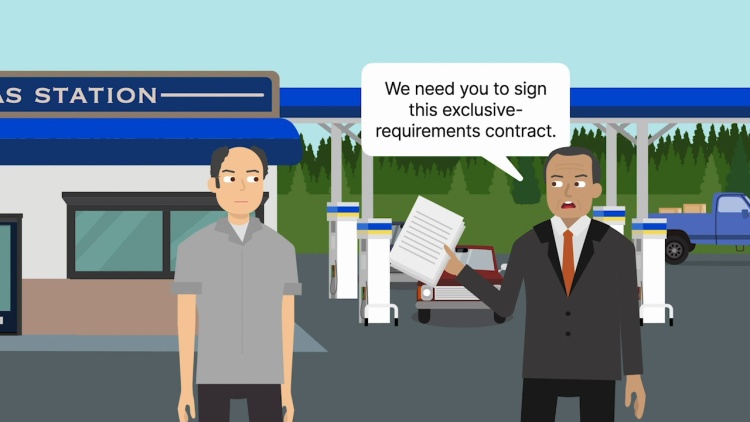Standard Oil Co. of California (Standard Stations) v. United States
United States Supreme Court
337 U.S. 293 (1949)
- Written by Heather Whittemore, JD
Facts
The Standard Oil Company of California (Standard) (defendant) was the largest seller of gasoline in the western United States. Standard sold gasoline through its own service stations and to operators of independent service stations. It was common practice for gasoline distributors such as Standard to enter into exclusive-dealing arrangements with independent service stations, requiring the independent service stations to purchase all their gasoline from one distributor. In 1946 Standard sold 6.8 percent of all gasoline sold in the western United States through these exclusive requirements contracts. The United States government (plaintiff) accused Standard of violating § 3 of the Clayton Act through its use of the exclusive requirements contracts. The district court held that Standard had violated the Clayton Act because the contracts had a tendency to lessen competition in a substantial portion of the market. The district court reasoned that exclusive requirements contracts deny suppliers the opportunity to compete for contracts and prevent buyers from seeking products from other suppliers. Because of the likelihood that the exclusive requirements contracts would restrict competition, the district court did not hear arguments from Standard regarding the business justifications for entering into the contracts or evidence regarding the specific consequences for competition the contracts had produced. Standard appealed.
Rule of Law
Issue
Holding and Reasoning (Frankfurter, J.)
Dissent (Jackson, J.)
Dissent (Douglas, J.)
What to do next…
Here's why 901,000 law students have relied on our case briefs:
- Written by law professors and practitioners, not other law students. 47,100 briefs, keyed to 994 casebooks. Top-notch customer support.
- The right amount of information, includes the facts, issues, rule of law, holding and reasoning, and any concurrences and dissents.
- Access in your classes, works on your mobile and tablet. Massive library of related video lessons and high quality multiple-choice questions.
- Easy to use, uniform format for every case brief. Written in plain English, not in legalese. Our briefs summarize and simplify; they don’t just repeat the court’s language.





